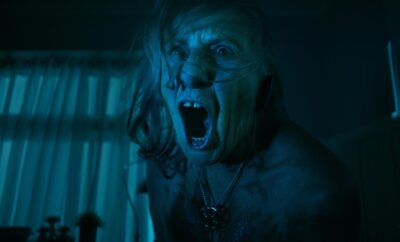
Movie Reviews
Hindsight Project Program
By: Jennifer Vintzileos
This year, the AFI Docs Festival offered a special program called the Hindsight Project Program. Primarily focusing on Black, Indigenous and People of Color (BIPOC), these short films highlighted the challenges that BIPOC faced during the COVID-19 pandemic in 2020. Out of six films, I had the chance to watch them: Now Let Us Sing and We Stay In The House.
Now Let Us Sing
Now Let Us Sing is a piece directed by Dilsey Davis, who along with Cara Williams and Eric Dozier founded One Human Family. Based in North Carolina, One Human Family embraces diversity and unity through honest dialogue, multi-media and artistic expression. The One Human Family Choir utilizes music to share their message to create spaces to talk about race and have those difficult conversations. When the choir was set to tour the South in 2020, the pandemic hit and shut down everything. In an effort to keep the choir going members of One Human Family took to meeting virtually to keep with voice lessons, meetings to discuss going forward, and eventually finding a way to come together for a family day and share their passion of singing.
The magic of Now Let Us Sing comes from Dilsey Davis, herself, who directed and produced the film. Coming from a mixed background she found her own voice in singing and knew that when the pandemic had hindered the group’s ability to gather she needed to do something. Rather than allow the sadness and anger to take over, Davis focuses on an important conclusion: “I have to continue to sing. I have to continue to have a voice.” And in that determination, she helped her choir find their voices again.
For more information on Now Let Us Sing and One Human Family, please visit the following sites:
https://docs.afi.com/2021/spotlight-on-the-hindsight-project-2021/now-let-us-sing/
https://www.onehumanfamily.org/.
We Stay In The House
When the pandemic hit, lockdowns were imposed on many cities and states. Businesses shuttered, schools took to virtual learning and several lost their jobs. We Stay In The House explores how three mothers in New Orleans handle the loss of their work and take to being at home with their families during this time. The focus of the story is on Ashleigh Branch (teacher and comedian), Lauren Turner (theater maker) and Tiffany Vega-Gibson (theater producer). As their children take center stage during lockdown, each woman shares the loss in their own identity. For Ashleigh, it’s her comedy routine. Lauren has lost a theater member due to the pandemic. And Tiffany not only lost her income, but almost her life as she contracted COVID-19 and had to be hospitalized.
Director Kiyoko McCrae also makes sure to briefly appear during the filming process, as she is also a mother. We Stay In The House shows how women have been affected career-wise during the COVID-19 pandemic. Since March of 2020, nearly 3 million women have been furloughed, laid-off or withdrawn from their jobs. The level of employment is at the lowest since 1988. For Ashleigh, Lauren and Tiffany, their story was a common one for 2020: keeping their children safe and sacrificing important parts of themselves to do just that. And ultimately, like in the case of Tiffany, making it to get vaccinated and embracing the hope that better times are ahead.
For more information on Kiyoko McCrae and the film, please visit the following websites:
https://docs.afi.com/2021/spotlight-on-the-hindsight-project-2021/we-stay-in-the-house/





You must be logged in to post a comment Login